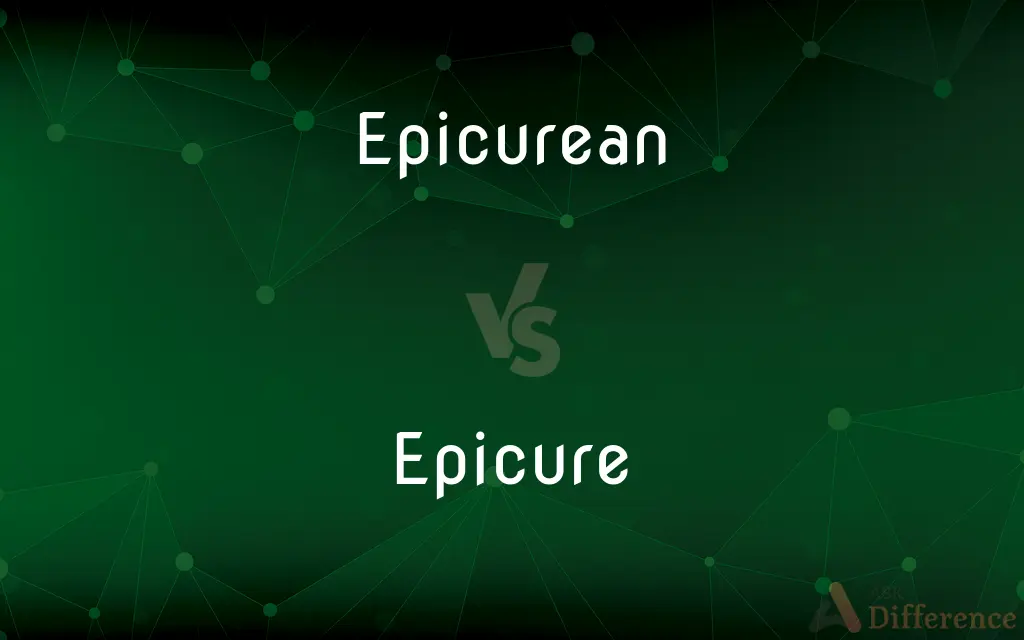Epicurean vs. Epicure — What's the Difference?
By Tayyaba Rehman & Maham Liaqat — Updated on April 2, 2024
Epicurean emphasizes a philosophy valuing simple pleasures, while an epicure has a refined taste in food and wine.

Difference Between Epicurean and Epicure
Table of Contents
ADVERTISEMENT
Key Differences
Epicurean philosophy is broader, advocating for pleasure as the greatest good, focusing on mental over physical pleasures for a serene life. In contrast, an epicure is specifically someone who delights in fine food and drink, emphasizing sensory experiences rather than a philosophical outlook.
While Epicureanism includes ethical and philosophical considerations about how to live a fulfilling life, an epicure's focus is narrower, often limited to culinary excellence and the enjoyment of gastronomic experiences. This distinction highlights the depth and scope of Epicurean thought versus the more singular passion of the epicure.
Epicureanism, originating with the Greek philosopher Epicurus, encompasses a wide range of teachings about happiness, virtue, and the nature of pleasure. Conversely, being an epicure does not imply adherence to any particular philosophical system, but rather a discerning palate and an appreciation for gourmet experiences.
The term "Epicurean" can sometimes be used to describe a lifestyle or attitude towards life that values pleasure in a broad sense, including the arts, friendship, and intellectual pursuits, while an epicure might specifically seek out luxurious dining experiences, rare wines, and exquisite flavors.
Despite their differences, both Epicureans and epicures share a fundamental appreciation for pleasure. However, Epicureanism's pursuit of happiness is guided by wisdom and moderation, whereas an epicure’s enjoyment may prioritize culinary delights without the same philosophical underpinnings.
ADVERTISEMENT
Comparison Chart
Definition
A philosophy advocating pleasure as the highest good.
A person with a refined taste in food and wine.
Focus
Ethical and philosophical considerations.
Culinary excellence and sensory experiences.
Origin
Greek philosophy by Epicurus.
Derived from Epicureanism but focuses on gastronomy.
Lifestyle
Values a broad range of pleasures with moderation.
Often associated with luxury and indulgence in food and drink.
Philosophical Depth
Includes teachings on happiness, virtue, and simplicity.
Primarily concerned with gastronomy, not philosophy.
Compare with Definitions
Epicurean
Pertaining to the philosophy of Epicurus, emphasizing pleasure as the highest good.
Her Epicurean lifestyle focused on enjoying life's simple pleasures.
Epicure
Someone who delights in gourmet dining experiences.
The restaurant's menu was designed to satisfy even the most demanding epicure.
Epicurean
Advocating for a life of moderate pleasures to achieve serenity.
The Epicurean approach to life recommends moderation in all things.
Epicure
A person with a fine appreciation of food and drink.
As an epicure, he traveled the world tasting exotic cuisines.
Epicurean
Focused on the pursuit of happiness through wisdom.
Epicurean teachings guide followers towards a fulfilling and mindful existence.
Epicure
Often associated with indulgence in the finest culinary delights.
The epicure spared no expense to experience the ultimate in dining excellence.
Epicurean
Someone who follows Epicurean philosophy.
As an Epicurean, he valued friendship and intellectual discussions about happiness.
Epicure
A connoisseur of good food and wine, often seeking luxury.
She was known as an epicure for her extensive wine cellar and love of truffles.
Epicurean
Finding joy in both intellectual and physical pleasures.
The Epicurean ideal includes the appreciation of art, music, and conversation.
Epicure
Values the sensory pleasures derived from eating and drinking.
For the epicure, a perfectly balanced meal was one of life's greatest joys.
Epicurean
Devoted to the pursuit of sensual pleasure, especially to the enjoyment of good food and comfort.
Epicure
A person with refined taste, especially in food and wine.
Epicurean
Suited to the tastes of an epicure
An epicurean feast.
Epicure
A person devoted to sensuous pleasure and luxurious living.
Epicurean
Epicurean Of or relating to Epicurus or Epicureanism.
Epicure
A person who takes particular pleasure in fine food and drink.
Epicurean
A devotee to sensuous and luxurious living; an epicure.
Epicure
A follower of Epicurus; an Epicurean.
Epicurean
Epicurean A follower of Epicurus.
Epicure
One devoted to dainty or luxurious sensual enjoyments, esp. to the luxuries of the table.
Epicurean
Pursuing pleasure, especially in reference to food or comfort.
Epicure
A person devoted to refined sensuous enjoyment (especially good food and drink)
Epicurean
Devoted to luxurious living.
Epicurean
One who is devoted to pleasure.
Epicurean
Pertaining to Epicurus, or following his philosophy.
Epicurean
Given to luxury; adapted to luxurious tastes; luxurious; pertaining to good eating.
Courses of the most refined and epicurean dishes.
Epicurean
A follower or Epicurus.
Epicurean
One given to epicurean indulgence.
Epicurean
A person devoted to refined sensuous enjoyment (especially good food and drink)
Epicurean
Of Epicurus or epicureanism;
Epicurean philosophy
Epicurean
Devoted to pleasure;
A hedonic thrill
Lives of unending hedonistic delight
Epicurean pleasures
Epicurean
Furnishing gratification of the senses;
An epicurean banquet
Enjoyed a luxurious suite with a crystal chandelier and thick oriental rugs
Lucullus spent the remainder of his days in voluptuous magnificence
A chinchilla robe of sybaritic lavishness
Common Curiosities
What is the historical origin of Epicureanism?
Epicureanism is a philosophy founded by Epicurus in ancient Greece, advocating for pleasure as the primary or most important intrinsic good.
Can an epicure be an Epicurean?
Yes, an epicure can also be an Epicurean if they value culinary pleasures within the context of Epicureanism's broader philosophical teachings.
Why is Epicureanism considered a philosophy?
Epicureanism addresses ethical and existential questions about the nature of happiness, the pursuit of pleasure, and how to live a fulfilling life.
Can Epicureanism contribute to a modern lifestyle?
Yes, its principles of seeking happiness through moderation, valuing friendships, and enjoying life's pleasures can be applied to contemporary living.
What defines an Epicurean?
An Epicurean is someone who adheres to Epicureanism, a philosophy valuing pleasure as the highest good, with a focus on simplicity and moderation.
How does an epicure differ from an Epicurean?
An epicure specifically appreciates fine food and wine, while an Epicurean follows a broader philosophical system emphasizing overall pleasure and happiness.
Is being an epicure solely about luxury?
While often associated with luxury, being an epicure fundamentally means having a refined taste in food and wine, regardless of extravagance.
What distinguishes an epicure’s interest in food from a gourmet’s?
The terms are often used interchangeably, but an epicure's interest may specifically emphasize the enjoyment and sensuality of eating and drinking, while a gourmet might also be interested in the culinary arts and cooking techniques.
How does Epicureanism view pleasure?
Epicureanism advocates for pleasure as the greatest good but emphasizes mental pleasures over physical ones, advocating moderation and wisdom in the pursuit of happiness.
What are the key teachings of Epicurus that influence Epicureanism?
Key teachings include the pursuit of pleasure as the ultimate good, the importance of friendship, the avoidance of unnecessary desires, and the search for tranquility and freedom from fear.
How is the term "Epicurean" used in modern contexts?
It can describe a lifestyle or attitude that values sensory pleasures, intellectual pursuits, and a balanced approach to happiness.
What role does moderation play in Epicureanism?
Moderation is crucial in avoiding pain and achieving a stable and lasting happiness, according to Epicurean philosophy.
Do all epicures follow Epicurean philosophy?
Not necessarily. While epicures appreciate gourmet food and wine, they may not subscribe to the broader philosophical teachings of Epicureanism.
Is Epicureanism atheistic?
Epicureanism posits that gods exist but are not involved in human affairs, so it encourages living without fear of divine intervention, focusing instead on earthly pleasures.
Share Your Discovery

Previous Comparison
Consent vs. Consensus
Next Comparison
Diphyodont vs. MonophyodontAuthor Spotlight
Written by
Tayyaba RehmanTayyaba Rehman is a distinguished writer, currently serving as a primary contributor to askdifference.com. As a researcher in semantics and etymology, Tayyaba's passion for the complexity of languages and their distinctions has found a perfect home on the platform. Tayyaba delves into the intricacies of language, distinguishing between commonly confused words and phrases, thereby providing clarity for readers worldwide.
Co-written by
Maham Liaqat















































